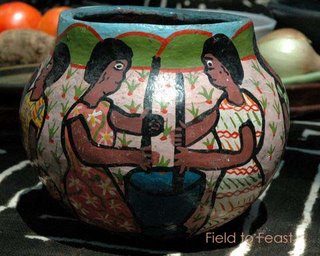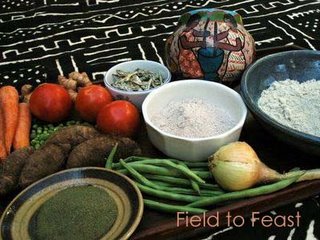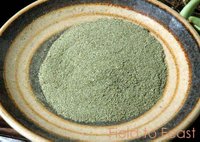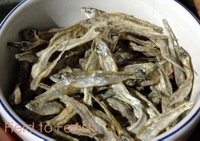 “Nice things, cheap things”– Dorothy’s apt, four-word description of Mbare Musika (Mbare Market). Until yesterday, Mark and I had yet to visit this renowned market south of downtown
“Nice things, cheap things”– Dorothy’s apt, four-word description of Mbare Musika (Mbare Market). Until yesterday, Mark and I had yet to visit this renowned market south of downtown
Dorothy accompanied us to serve as our guide and to ensure we didn’t get murungu (white person) prices. She is an excellent bargainer, and always asked vendors for our banzela – or free gift – such as the bowl above. Plus, Dorothy is lots of fun to be around, with an infectious laugh that probably would have drawn the attention of everyone in the market even if she hadn’t been walking around with the only white people within a five-mile radius. Like many markets, Mbare attracts its share of pickpockets and other unsavory elements, so we brought little cash, no cell phones and, unfortunately, no camera. I hope my words do the place justice.
The market grid is loosely divided into sections. In one section there are vendors selling grain, grain meal, beans, dried vegetables (including mufushwa), and mopani worms (fat, grey-black, dried caterpillars). Traditional healers (n’anga) manned booths in another area, hawking bottles of unidentifiable objects floating in tea-colored liquid, bits of horn, animal skins, and bowls filled with various pale-colored powders. A large group of stands sold school uniforms, flip flops, electrical equipment, clothes and other sundries. And, of course, there were row upon row of fruit and vegetable vendors. Unlike, say, a market on the Mexican border, you are encouraged – but not harassed – to buy, which makes pleasant, laid-back browsing possible.
Here are the market scenes that caught my eye: men and women deftly shelling peas, with woven plates on their laps to catch the peas and discarded pea pods collecting by their feet. A vegetable vendor leaning back comfortably upon a tall pile of cabbages. The requisite person walking around with a chicken under his arm. The surprised look of the woman carrying a huge bag of potatoes and balancing a full-to-the-brim basket on her head, whom I almost ran into. Produce being loaded onto rickety trucks for distribution and sale at the local supermarkets. A hand-painted sign that read “Save water, drink beer,” hung in front of a pile of hollowed-out gourds (perfect for beer drinking) and next to mounds of chimera, a malted grain meal used to make home brew.
 ginger. Beyond these standards, regular readers will recognize the ugly dumbe. We also bought two types of meal – sorghum meal and rapoko (finger millet meal), both of which can be used to
ginger. Beyond these standards, regular readers will recognize the ugly dumbe. We also bought two types of meal – sorghum meal and rapoko (finger millet meal), both of which can be used to make sadza as an alternative to the more commonly-used maize meal. Another one of our purchases was okra that had been dried and pounded, creating a fine green powder ideal for sautéing with tomatoes and onions to create a sadza-accompanying relish. And those beady eyes staring back at you from the photo? They are kapenta, a dried fish. I’ll be cooking with some of these items over the next few weeks, so stay tuned!
make sadza as an alternative to the more commonly-used maize meal. Another one of our purchases was okra that had been dried and pounded, creating a fine green powder ideal for sautéing with tomatoes and onions to create a sadza-accompanying relish. And those beady eyes staring back at you from the photo? They are kapenta, a dried fish. I’ll be cooking with some of these items over the next few weeks, so stay tuned!






7 comments:
How I miss a good market! And you've seen your fair share haven't you!
I went to Mbare only once, shame, should have gone more often. What stands out in my memory is the N'anga section a.k.a. "dead things place". What I saw that day! Bones, skulls, bodies, and more. I still remember it. I'd gone with another young woman (well, I was young, then) and we'd been harassed mercilessly. Maybe we should have taken Dorothy. But was quite an adventure none the less.
Can't wait for your Kapenta recipes - never did eat any while I was there - think the eyes put me off. Try to get up to Kariba - you'll see the Kapenta boats out there - like Pirates of the Caribbean meets Mad Max (only slightly smaller). Wild.
I've just discovered your blog and I think it is terrific. It definitely is an insight into African food and culture that many of us in Sydney (australia) do not here or read about. So thanks and keep 'em coming!
I've just found your blog - and how wonderful it is! I have a strong urge to jump on a plane to Africa but work has to be done. I shall have to make Anytime Tart today to cheer me up. Hurry and write more!
Hi all,
ExAfrica, just for you...made kapenta yesterday! I can't say you were missing too much in not trying them when you lived in Zim.... My husband likes anchovies so he enjoyed the dish, but i tend to like fish that doesn't taste like fish, so I was not quite as keen.
JenJen, thanks for visiting! I used to live in Australia (Brisbane) and it is one of my favorite places in the world. I am very happy to have Australian visitors to my blog - please come back!
Alex, sorry you have to work and can't jump on that plane! Did you try the tart?
Best wishes,
Carolyn
This is a well written description of Mbare.
banzela is actually MBASERA, if you are in Uk you would ask for a discount
I was wondering if you knew of a place I can buy some Okra powder in the states. Thanks!
Carolyn,
I am reading The Ear, the Eye, and the Arm by Nancy Farmer, a Young Adult (YA) science fiction novel set in Zimbabwe. The author lived for many years in Zimbabwe. In the novel, the three child protagonists are kidnapped from the Mbare Musika, and taken to an area called Dead Man's Vlei (marsh) where they are held among large piles of garbage. The children live in a mansion in Mazoe (where is this place?) Is Zimbabwe safe to visit? In particular, is Mbare Musika safe?
--Jim
Post a Comment